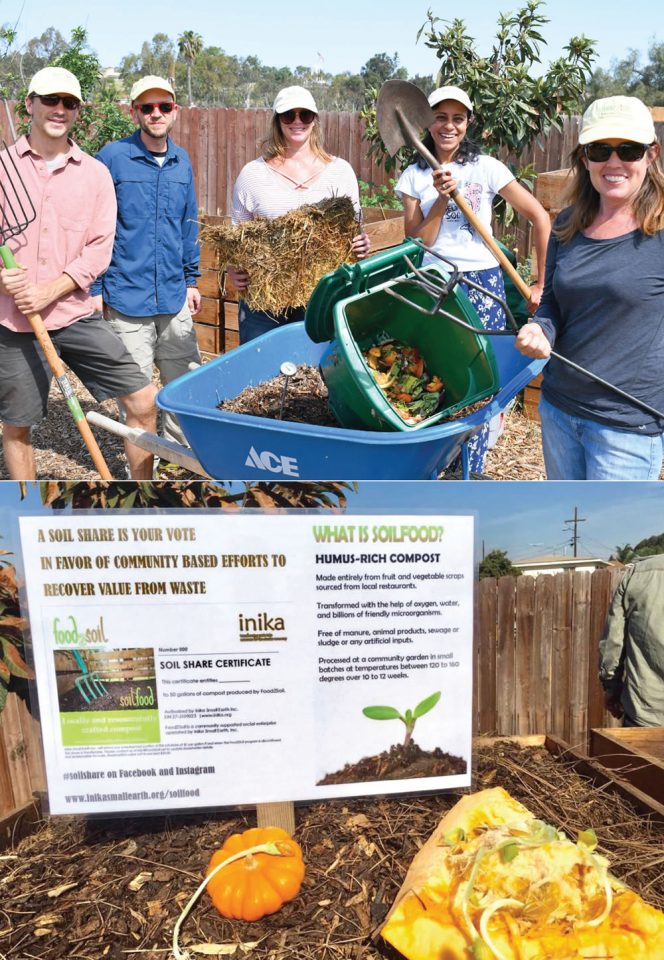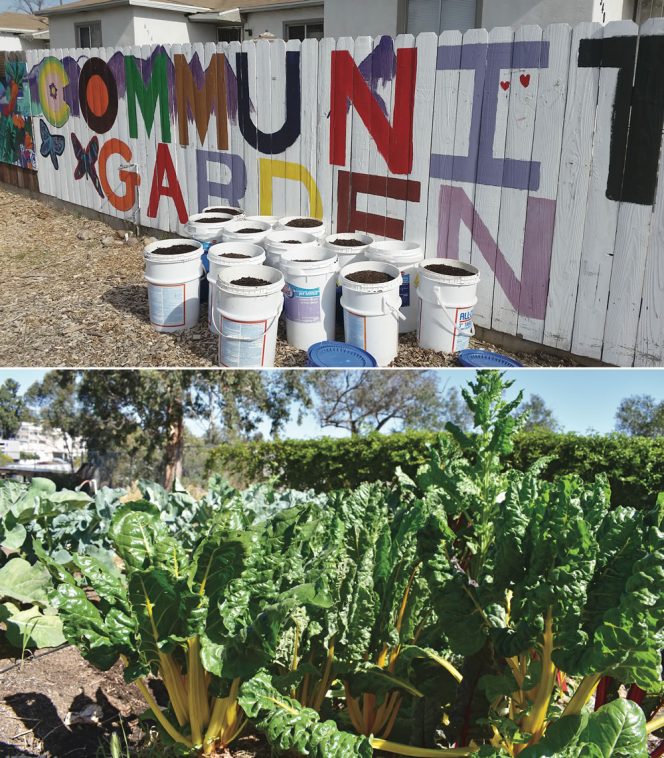San Diego nonprofit collaborates with local generators, growers and gardeners “to transform food scraps into social, environmental and economic goods for communities.”
Richard Flammer
BioCycle August 2018

Food2Soil team (top, from left to right): Skyler Wilder, Richard Williamson, Tara Stowell, Sarah Boltwala-Mesina and Jennifer Linder. Signage (bottom) describes Food2Soil’s mission of recovering food scraps to make “soil food.” Photos by Omez Mesina
Sarah Boltwala-Mesina, Inika’s Executive Director, drew upon a decade of work in corporate finance, financial advisory and valuation consulting to develop the hyperlocal loops that facilitate the exchange of scraps among restaurants, composters and gardeners. “There is no financial incentive for anyone to do the right thing,” she notes. “Food2Soil’s goal is to identify and build those missing financial incentives. Composting was something I felt every community could do without a huge investment.”
Most food scraps generated in San Diego County are landfilled, with the only two large-scale composting facilities that accept them processing less than one percent of the total volume generated. Food2Soil’s decentralized approach aims to increase that percentage, with a focus on the triple bottom line to boot: “Our programs build community capacity to divert food scraps, replenish our local soil and create jobs in the process,” says Boltwala-Mesina. “It’s a people-powered approach to recovering value from discarded compostable materials.”
Ordinance Exclusion
Food2Soil’s journey has not been without challenges related to identifying sites, enlisting food scrap generators, doing collection, and maintaining a base of volunteers and interns. One roadblock involved revisions to the San Diego Municipal Code, effective on July 1, 2017, that prohibited non-franchise haulers to charge fees for the collection and transportation of food waste. That dynamic prevented programs like Food2Soil from covering costs or making a profit from their microenterprises, as haulers not already registered under the franchise program could not legally collect compostable materials nor charge a fee for collection. Hence, the microcollection routes for businesses eager to have their compostable materials managed sustainably were not an option, and food scraps continued to be landfilled.
The City of San Diego understood the problem, and on February 9, 2018, passed Ordinance Number 20900, amending the recyclable material franchise exclusion. Under that revision, the “Certified Recyclable Materials Collector” was added, and entities that applied and were accepted into the program are allowed to collect up to 1,000 tons/year of designated recyclables, including vegetative food material. The ordinance defines vegetative food material as “plant material, and that may be processed or cooked but must otherwise retain its natural character without any added salts, preservatives, fats or oils, or adulterants,” including… “fruits and vegetables, edible flowers and plants, outdated and spoiled produce, and coffee grounds.”
Beginning July 1, 2018, certified recyclable materials collectors handling vegetative food scraps are required to submit quarterly reports to the City of San Diego, which must include the name of those responsible for management of the facility where recyclable food materials are processed, the name and address of the facility serviced, weekly volume in cubic yards or gallons of recyclable food materials collected, and the names and addresses of the sites to which the recyclable food materials collected within the City were delivered for composting. A letter of acknowledgement from the site property owner providing their acceptance of the recyclable vegetative food materials for composting or final processing is also required. The ordinance prohibits recyclable vegetative food materials generated in the City of San Diego, and collected by certified recyclable materials collectors, being delivered to a landfill or other site for disposal.
“This is a victory for us because it sets a precedent for other jurisdictions to follow,” notes Boltwala-Mesina. “One thousand tons per year is plenty of room for community scale activities. It is also a very elegant solution where policy officials found room for us within the existing framework and didn’t have to create new certifications or designations.” This favorable development has opened the door to the hyperlocal loops so critical to capturing food scraps that larger, franchised haulers cannot.
Collection Services
Food2Soil offers a food scrap pick up for businesses and a drop-off program for individuals and households. It manages five composting hubs in the heart of the City of San Diego. The primary loop, which focuses on downtown and central San Diego, services four restaurants and 25 drop-off members, capturing 1,120 lbs/week of food scraps. Several similar loops are being developed and slated to be operating within the next 3 to 6 months.
Under the “Food2Soil Collective Memorandum of Understanding,” members, including individuals, households, and businesses, agree to follow established collection and food scrap contribution rules. Meat, dairy, bones, grease and plate scraps are not allowed. Nor are any other noncompostable materials, e.g., plastic, tin foil, that tend to hitch rides with food scraps into collection containers. Residential members are given a three-strike rule, and businesses are treated on a case-by-case basis, but multiple incidents of contamination can lead to them being bumped from the program. Food scraps should be no older than one week, and residential members are responsible for keeping their collection buckets clean.
Program participants pay a monthly membership fee based on the volume of material they generate. Residents, billed quarterly, pay $10/month for one 5-gallon bucket of vegetative food scraps dropped off at a compost hub, or $15/month for drop-off at a community collection point. Business members pay a $60 annual membership fee, and $15/30-gallon cart per pick-up, billed monthly.

Oceanview Growing Grounds Community Garden also serves as a community-scale composting hub. Photos by Omez Mesina and Jamie Wells
Compost Hubs
In addition to directly processing material, Food2Soil offers an 8-week internship program that trains individuals interested in starting their own compost hubs or being eligible for a paid position managing a hub for Food2Soil. Hub managers are described as “soil growers for their community,” and the program “aspires to teach them the art, science and business of composting, beginning from collection of food scraps to distribution and sale of finished compost.” Food2Soil summer intern Drew Rivera, who is a physician assistant when he’s not composting, is the type of person perfectly suited to be a soil grower. “I want to build a compost hub in Northern San Diego, to educate restaurants and community members about soil, renewable energy and conservation,” he explains. “I envision local restaurants using fresh produce from gardens fed by their own leftovers.”
Per Food2Soil’s MOU, “Any public or private entity that owns property can join the Collective as a compost hub by allocating space for composting of vegetative kitchen scraps generated onsite, contributed by employees, members or members of the larger community.” The hub host must agree to provide Food2Soil access to the garden and compost area, a source of water, a toolshed if available, and designate an area for bulking agent drop-off and storage.
Food2Soil designs the broader program based on the hub’s resources and available space, as well as specifics to the community it will serve, such as volume of compostables generated, bulking agent availability, and collection options. Bins, bulking agent, signage, compost thermometer, sifting screen and necessary composting implements are provided to each hub that joins the network. A trained hub manager is also assigned to the site, and is charged with managing all aspects of composting, including collection, loading the bins, aerating the material, and harvesting compost. Finished compost, branded as “Soilfood,” is sold in load-your-own bulk through the organization’s exclusive retail partner, City Farmers Nursery, which also doubles as a collection hub.
“We try to keep carbon miles on scraps and soil-growers to no more than 10 miles, so these invaluable resources — food scraps, soil and jobs — stay in the neighborhoods they come from,” adds Boltwala-Mesina, who is helping with formation of the California Alliance for Community Composting. Her impassioned, proactive approach to decentralized composting is making a difference in San Diego, one hub at a time, and holds great promise to be a model for other communities throughout the U.S.
Rich Flammer of Hidden Resources, a BioCycle Contributing Editor, is a composting and zero waste consultant (www.compostingconsultant.com). Learn more about Food2Soil at: http://www.food2soil.net.










